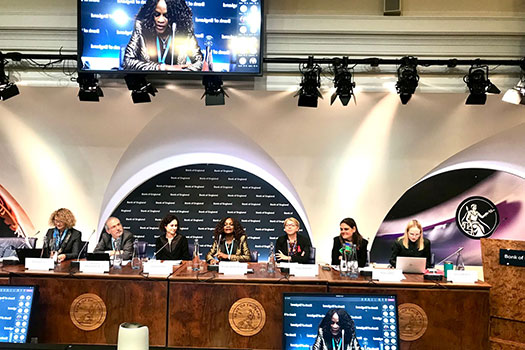CCLS co-organises conference on Central Bank Mandates in an Evolving World
On 1 and 2 December 2022, the Centre for Commercial Law Studies (CCLS) of Queen Mary University of London and the Legal Directorate of the Bank of England hosted a conference on Central Bank Mandates in an Evolving World.

The conference jointly co-organized by Sonya Branch, General Counsel of the BoE, and Professor Rosa M. Lastra, Sir John Lubbock Chair in Banking Law (CCLS, Queen Mary) was part of the MOCOMILA meeting and an event of the Sovereign Debt Forum (an initiative of Georgetown’s IIEL and Queen Mary University of London’s CCLS). The conference held in the auditorium of the Bank of England (BoE) brought together MOCOMILA members and Bank of England staff to discuss crypto-assets and CBDCs (in the first panel), climate change and sustainability (in the second panel) and accountability, legitimacy and communication (in the third panel). The panellists were:
- Diego Devos (General Counsel at the Bank for International Settlements)
- James Freis (founder of Market Integrity Solutions)
- Peter Follak (Independent Counsel and Consultant)
- Agasha Mugasha (Professor of Law at Gulu University)
- Benjamin Geva (Professor of Law at Osgoode Hall Law School)
- Rhoda Weeks-Brown (General Counsel at the International Monetary Fund)
- Sarah Breeden (Executive Director for Financial Stability Strategy and Risk at the BoE and a member of the Financial Policy Committee (FPC))
- Edouard Fernandez-Bollo (Member of the Supervisory Board of the Single Supervisory Mechanism, representing the ECB)
- Chiara Zilioli (General Counsel at the ECB)
- Joana Setzer (Assistant Professor at the Grantham Research Institute on Climate Change and the Environment)
- Lee Buchheit (Professor at the University of Edinburgh and Visiting Professor at CCLS, Queen Mary)
- Sonya Branch (general counsel at the BoE)
- Miss Rosa M. Lastra (Sir John Lubbock Chair in Banking Law at CCLS, Queen Mary)
- Mr Seb Walsh (Secretary at the BoE and former chief press office)
- Mr Christos Gortsos (professor at the University of Athens)
- Mr Michael Waibel (professor of International Law at the University of Vienna)
Day one
1st Panel on Cryptoassets and CBDCs
After initial remarks by Sonya Branch and Rosa Lastra, Diego Devos, as chaired of the first panel, introduced the four panellists. James Freis discussed ‘Stablecoins and Financial Stability’. Peter Follak focused on the treatment of cryptoassets within the remits of property law under several jurisdictions.
Agasha Mugasha talked about the digitisation of trade finance, making references to the UK’s Electronic Trade Documents Bill and the UNCITRAL’s Model Law on Electronic Transferable Records (MLETR). Finally, Benjamin Geva considered CBDCs.
2nd Panel on Climate Change and Sustainability
Rhoda Weeks-Brown, as chair of the second panel, explained the role of the IMF in assisting its members in the area of climate change and referred to the recently adopted Resilience and Sustainability Trust, which assists vulnerable countries by increasing their resiliency to external shocks, including climate change-related ones.
Sarah Breeden presented an account of the roles of central banks in climate change, focusing in particular on the Bank of England and its efforts to ensure that the financial system develops resilience against climate related risks (which, in her own words, are ‘far reaching in breadth and scope’) and discussed the transition to a net-zero economy (greening financing and financing green).
Edouard Fernandez-Bollo discusses recent initiatives by the European Central Bank in its role as supervisory authority (SSM) and highlighted the need to incorporate climate change in risk management and to carry out stress tests that take into account climate related risks.
Chiara Zilioli explained the role of the ECB in climate change and the authority derived from its primary objective (price stability) and secondary objective (support of general economic policies of the EU, which includes environmental protection).
Joana Setzer discussed climate related litigation and referred to a number of interesting cases, including lawsuits against the European Investment Bank (EIB), the governments of Belgium and Australia, and the Social and Economic Development Bank of Brazil’s equity investment subsidiary (BNDESPAR).
Lee Buchheit elaborated on the interplay between climate and sovereign debt restructuring, mentioning debt-for-nature swaps, including the innovative case of the Government of Belize ‘blue loan’ structured by rhe Nature Conservancy (TNC), which allowed Belize to repurchase a relevant part of its sovereign indebtedness from bondholders at a significant discount. He also referred to the International Capital Markets Association (ICMA) climate resilient debt clauses (CRDCs) that automatically allow sovereign debt payment deferment upon the materialisation of pre-defined climate-related disasters.
Day two
Panel on Accountability, Legitimacy, and Communication of Central Bank
The panel was chaired by Sonya Branch, who emphasized the need for transparency and accountability as the counterpart of central bank independence. She discussed a number of issues – including recent events in the UK and the Future Regulatory Framework (FRF) – before introducing the panellists.
Rosa Lastra, keynote speaker in the last panel, dissected old and new paradigms of accountability, contrasting the differences between the US, the UK and the EU, when it comes to judicial and parliamentary accountability mechanisms. Drawing on her experience as Specialist Adviser to the House of Lords and member of the monetary expert panel of the European Parliament, Professor Lastra discussed the concepts of legitimacy and transparency and the ever increasing importance central bank communication.
Seb Walsh approached the subject from a historical perspective, commencing on the changes introduced in 1997 and the subsequent evolution of the role of the Bank of England, drawing on his former position as chief press officer and his current experience. Christos Gortsos further expanded the debate on accountability observing how ideology plays a key role in the Monetary Dialogue between the ECB and the European Parliament. Finally, Michael Waibel, discussed the effect of judicialization on central banking legitimacy and accountability, drawing on the recent jurisprudence in this area of the Court of Justice of the European Union.